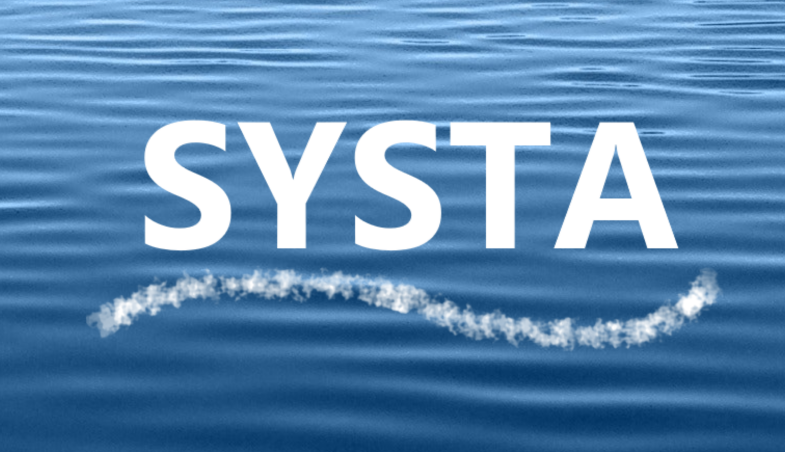IAHS News
IAHS Digital Platform Innovation Call
As a worldwide learned society IAHS has always facilitated collective epistemological progress, knowledge capitalization and scientific dialogue, through the mechanisms of networking, sharing and debating on emerging topics and through agenda-setting initiatives. In line with our parent bodies IUGG and ISC (formerly ICSU), IAHS has always been proactive in bridging divides and defending values, which are now reframed in the Open Science principles *.
The demographics and practices of the community are changing, the digital revolution is accelerating, and the current pandemic induces both constraints and innovations.
To reinforce IAHS’s values - for the community and fed by the community - we are inviting ideas for the Association’s digital acceleration. To coincide with its centenary, IAHS wishes to implement a web platform and software system to effectively link and display global hydrological knowledge and scientific findings, and to facilitate new networking and knowledge management.
Systems could involve existing and/or new products and could potentially address some of the following requirements:
1. Graphic display of hydrological case studies from each continent, with community input
2. Overview of ongoing hydrological activities and scientific achievements
3. Opportunity for data sharing
4. Ability to link groups and foster scientific collaboration
5. Internal community building within and between IAHS Commissions and Working Groups
6. Engagement of and with partners, stakeholders and citizens
7. Framework for displaying and linking projects involved in the Panta Rhei and Unsolved Problems in Hydrology (UPH) initiatives
8. Evolution and innovation over time to provide an on-going platform and archive
To enable the Association to brainstorm ideas for this community-led strategic shift, submit your outline suggestions and aspirations by June 15th 2021 by email to [email protected]
* See the actual intergovernmental process on Open Science, coordinated by UNESCO, to which we contribute via ISC, https://en.unesco.org/science-sustainable-future/open-science
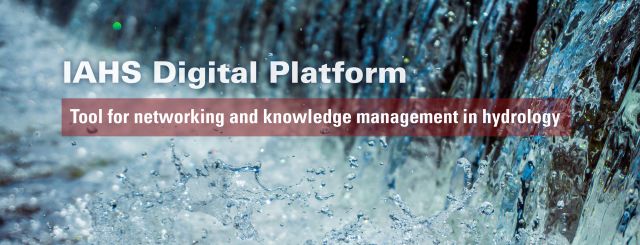
Obituary: Pierre J. Y. HUBERT
Version française ci-dessous / French version at the bottom
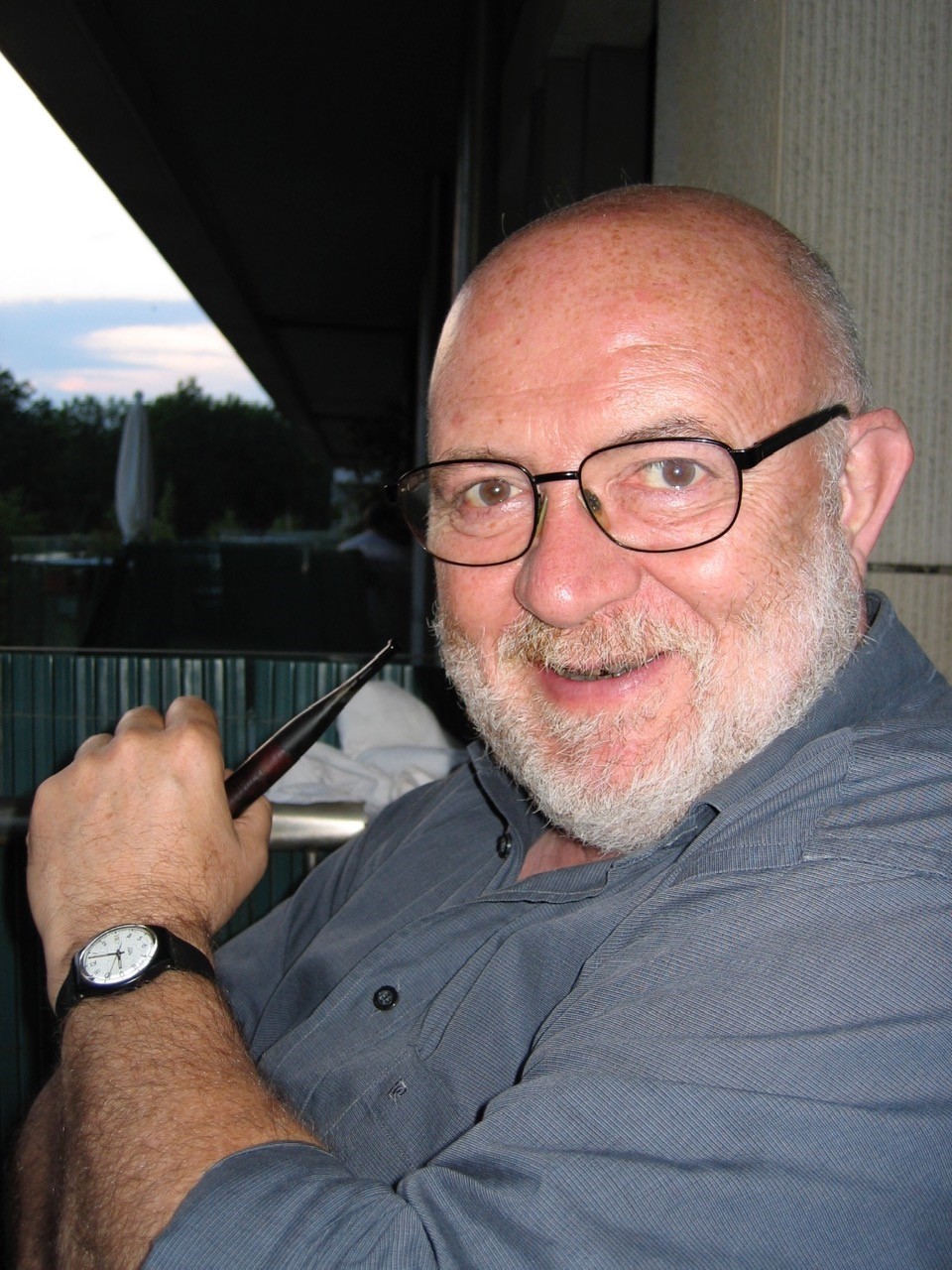
Pierre Hubert (1943–2020) passed away on 31st December 2020. He graduated with a degree in engineering from the Ecole Centrale in Paris in 1967, and was awarded his PhD in 1971 and his Habilitation (Doctorat ès Sciences) in hydrology in 1986 from the Université Pierre et Marie Curie in Paris. He worked from 1971 to 2007 for the Ecole des Mines de Paris, and he has long been at the heart of Paris’s multi-institutional masters and doctoral hydrology curricula.
Pierre developed wide-ranging research interests in hydrology, from theoretical aspects to science support to water management, with a strong engagement in exploring multi-disciplinary approaches and with intensive international activity. This allowed him to tackle a diverse range of challenges across hydro-climatic, socio-hydrological and geopolitical contexts, always with a panoramic overview and contribution.
Pierre was at the leading edge of science in several areas, including isotopic hydro(geo)logy, modelling, scaling (fractal and multifractal), geostatistics and change detection, as applied to various hydro-meteorological variables and settings. The Hubert segmentation method is now a key tool for any hydro-climatologist addressing the question of change. His methodological developments led to improvements in the design of monitoring networks, to enhanced understanding of processes and patterns, and to the modelling and optimization of resource and hazard management.
Pierre developed and facilitated bilateral and multilateral cooperation initiatives with Quebec, Tunisia, Algeria, West Africa, Romania, Russia and beyond, continually supporting individuals, groups and networks to plug gaps in scientific knowledge. All this he undertook with a deep trust that the humanistic values of science and education are universal and independent from politics, and that the epistemological values of hydrological science benefit from exploring hydrological diversity across the world.
Pierre was rapidly identified as a multifaceted expert, as well as a very pleasant character, in French, francophone and international institutions and communities. He used his multiple engagements to encourage the emergence, funding and articulation of mechanisms of cooperation. He has been active in the French SHF—Société Hydrotechnique de France—and its Milon Prize. He has been a long-term contributor to the UNESCO International Hydrological Programme and the WMO Commission for Hydrology, representing France, then IAHS and IUGG.
Pierre was a key player in the organization management of conferences and publications (front and backstage), concerned both with scientific content and accessibility/open access, hence creating platforms for scientific sharing, consolidation, capitalization and dissemination. Beyond editorial and peer-reviewing tasks, he was particularly active on the francophone side of the then-bilingual Hydrological Sciences Journal of IAHS, and of the multilingual UNESCO–WMO International Glossary of Hydrology, which he expanded in its linguistic coverage and online accessibility: http://hydrologie.org/glu/aglo.htm. Furthermore, he made pioneering use of the opportunities offered by the internet to facilitate the open archiving of publications and the networking of scientists, in particular with the establishment and enduring management of the francophone portal http://hydrologie.org.
Pierre engaged early in IAHS—the International Association of Hydrological Sciences—recognizing in the Association a unique worldwide network whose vocation was close to his values, and where he could scale up his own actions for articulating hydrological sciences and players. He served as President of the French IAHS, then IUGG chapters, from 1990 to 2000. After undertaking various roles in IAHS commissions and publications, he was Secretary General of IAHS from 2000–2011, thanks first to a nomination when the position became vacant, and subsequently to two elections. He was particularly involved and efficient in facilitating the functioning of the Association, the emergence of digitization, the digital rescue and open archiving of the IAHS publication series, the shaping of the agenda-setting PUB—Prediction in Ungauged Basin—decade, and the partnership with UN Agencies (in particular UNESCO IHP and WMO CHy). He also accompanied the emergence of IACS, and facilitated interfaces with sister associations and contributions to transversal initiatives of IUGG. From 2011 to 2019, he continued as a bureau member of IUGG, not only representing hydrological sciences but also contributing to the strategy of the Union, from Earth System Science approaches to the celebration of the 100th Anniversary.
Pierre Hubert received the IAHS–UNESCO–WMO International Hydrology Prize / Volker Medal in 2015 in recognition of his scientific excellence and engagement with the community. For similar reasons, he was made knight of the Légion d’honneur in France. The many messages shared over the last weeks across various networks acknowledge this double reputation, and they also list countless anecdotes and testimonials of how Pierre ceaselessly blended the ventures of science and humanity.
Prof. Christophe Cudennec, Institut Agro, France & Secretary General of IAHS
Nécrologie
Pierre J. Y. HUBERT
Pierre Hubert (1943–2020) est décédé le 31 Décembre 2020. Il était ingénieur de l’Ecole Centrale de Paris (1967), Docteur (1971) et Docteur ès Sciences (1986) en hydrologie de l’Université Pierre et Marie Curie de Paris. Il était en poste à l’Ecole des Mines de Paris de 1971 à 2007, et a longtemps été au coeur des formations Parisiennes co-accréditées en hydrologie.
Pierre a développé un large spectre d’activités scientifiques, allant de développements théoriques à l’aide à la gestion opérationnelle de l’eau, explorant des approches multi-disciplinaires et développant une activité internationale intense. Cela lui a permis d’aborder une large gamme d’enjeux à travers des contextes hydro-climatiques, socio-hydrologiques et géopolitiques diversifiés, menant à une vision et à une contribution panoramiques.
Pierre a été sur le front de science dans plusieurs domaines, en particulier l’hydro(géo)logie isotopique, la modélisation, les effets d’échelles (fractalité et multifractalité), les géostatistiques et la détection de changement, appliqués à diverses variables hydro-météorologiques et à divers contextes. La méthode de segmentation de Hubert est désormais incontournable pour tout hydro-climatologue qui explore les questions de changement. Ses développements méthodologiques ont permis des améliorations dans l’implantation des réseaux d’observation, la compréhension naturaliste des processus et des structures, la modélisation et l’optimisation de la gestion des ressources et des aléas.
Pierre a développé et accompagné des coopérations bilatérales et multilatérales avec le Québec, la Tunisie, l’Algérie, l’Afrique de l’Ouest, la Roumanie, la Russie …, toujours dans la perspective d’aider des individus, des groupes et des réseaux à déveloper les connaissances scientifiques. Il était guidé par une profonde confiance dans les valeurs humanistes de la science et de l’éducation, vues comme étant universelles et indépendantes de la politique, et dans l’idée que l’épistémologie de l’hydrologie devait pouvoir être enrichie par l’exploration de la diversité hydrologique à travers le monde.
Pierre a rapidement été identifié dans les institutions et les communautés Françaises, francophones et internationales, comme étant un expert multi-facettes, ainsi qu’une personne agréable. Il s’est appuyé sur ses engagements multiples pour encourager l’émergence, le financement et l’articulation de mécanismes de coopération. Il a été actif au sein de la SHF—Société Hydrotechnique de France— et son Prix Milon. Il a été un contributeur sur le long terme du Programme Hydrologique International de l’UNESCO et de la Commission d’Hydrologie de l’OMM, representant la France, puis l’AISH et l’UIGG.
Pierre a été un acteur important dans l’organisation et les coulisses de nombreuses conférences et publications, attentif à la fois au contenu scientifique et à l’accessibilité, et donc aux vertus du partage, de la consolidation, de la capitalisation et de la diffusion scientifiques. Au delà d’activités éditoriales, il a été particulièrement actif dans le versant francophone du Journal des Sciences Hydrologiques, alors bilingue, de l’AISH, et du Glossaire International d’Hydrologie multilingue de UNESCO-OMM, dont il a étendu la couverture linguistique et l’accessibilité en ligne : http://hydrologie.org/glu/aglo.htm. Il a, de plus, été pionnier dans l’utilisation d’internet pour l’archivage ouvert de publications et la mise en réseau de scientifiques, en particulier avec l’établissement et la gestion du portail francopone http://hydrologie.org.
Pierre s’est engagé tôt dans l’AISH—Association Internationale des Sciences Hydrologiques—reconnaissant dans l’Association un réseau Mondial unique dont la vocation correspondait à ses valeurs, et au sein de laquelle il pouvait élargir ses propres actions pour l’articulation des sciences et des acteurs hydrologiques. Il a servi comme Président des comités Français pour l’AISH et l’UIGG—Union Internationale de Géodésie et Géophysique—, de 1990 à 2000. Après avoir joué plusieurs rôles dans les commissions et au service des publications de l’AISH, il a été Secrétaire Général de l’AISH de 2000 à 2011, initialement nommé lorsque la fonction est devenue vacante, puis élu à deux reprises. Il était particulièrement investi et efficace dans le fonctionnement de l’Association, l’émergence de la digitalisation, la sauvegarde numérique et l’archivage ouvert des collections de publications, la formulation de la décennie PUB – Prévision dans les Bassins Non-jaugés, et les partenariats avec les Agences de l’ONU (en particulier l’UNESCO-PHI et l’OMM-CHy). Il a également accompagné l’émergence de l’IACS pour les sciences de la cryosphère, et a facilité des interfaces avec des associations soeurs et des contributions à des initiatives transversales de l’UIGG. De 2011 à 2019, il a prolongé son investissement associatif en étant membre du bureau de l’UIGG, non seulement représentant les sciences hydrologiques, mais aussi contribuant à la stratégie de l’Union, depuis l’articulation des Sciences du Système Terre jusqu’à la célébration du 100ème anniversaire.
Pierre Hubert a reçu la Médaille Volker du Prix International d’Hydrologie AISH–UNESCO–OMM en 2015 en reconnaissance de son excellence scientifique et de son engagement pour la communauté. Pour des raisons similaires, il a été élevé au grade de Chevalier de la Légion d’Honneur en France. Les nombreux messages échangés au cours des dernières semaines via différents réseaux confirment cette double réputation, et alignent en outre de multiples témoignages et anectotes, qui illustrent la façon dont Pierre a sans cesse imbriqué les aventures scientifiques et humaines.
Prof. Christophe Cudennec, Institut Agro, France & Secrétaire Général de l’AISH
Applications invited for IAHS Sivapalan Young Scientists Travel Awards
Applications are invited for the IAHS SYSTA (SIVAPALAN YOUNG SCIENTISTS TRAVEL AWARDS) towards the costs of participating at the following IAHS-badged conferences in 2021 and 2022:
STAHY 2021 – virtual event (registration only) – 16-17 September 2021
4th International Conference of the Great Rivers of Africa – Cotonou, Benin – 16-20 November 2021
IAHS 2022 Scientific Assembly - Montpellier, France – 29 May - 3 June 2022
Full details of the SYSTA eligibility criteria and application procedure are at: https://iahs.info/About-IAHS/SYSTA.do
The three key criteria are that applicants should be from, and currently reside in, a financially disadvantaged country, be within 5 years of their PhD award and be first author of a paper in Hydrological Sciences Journal (HSJ) or Proceedings of the International Association of Hydrological Sciences (PIAHS) or in another listed hydrological journal. Those who have previously received a SYSTA award for intercontinental travel are not eligible to apply. The maximum award value is 2500 euros.
The closing date for SYSTA applications for upcoming 2021 IAHS meetings is 12 noon (CET) on 18 June 2021.
Applications are welcomed for SYSTA awards for the IAHS 2022 Scientific Assembly and the deadline will be announced later in the year.
Any 2021 awards made under the SYSTA scheme will be transferred to the IAHS 2022 Scientific Assembly if it is not possible to use the awards in 2021 due to COVID-19 travel restrictions.
2021 International Hydrology Prize medallists
IAHS are pleased to announce the award of the International Hydrology Prize (Dooge medal and Volker medal) for 2021 to:
Dooge medal - Taikan Oki, Japan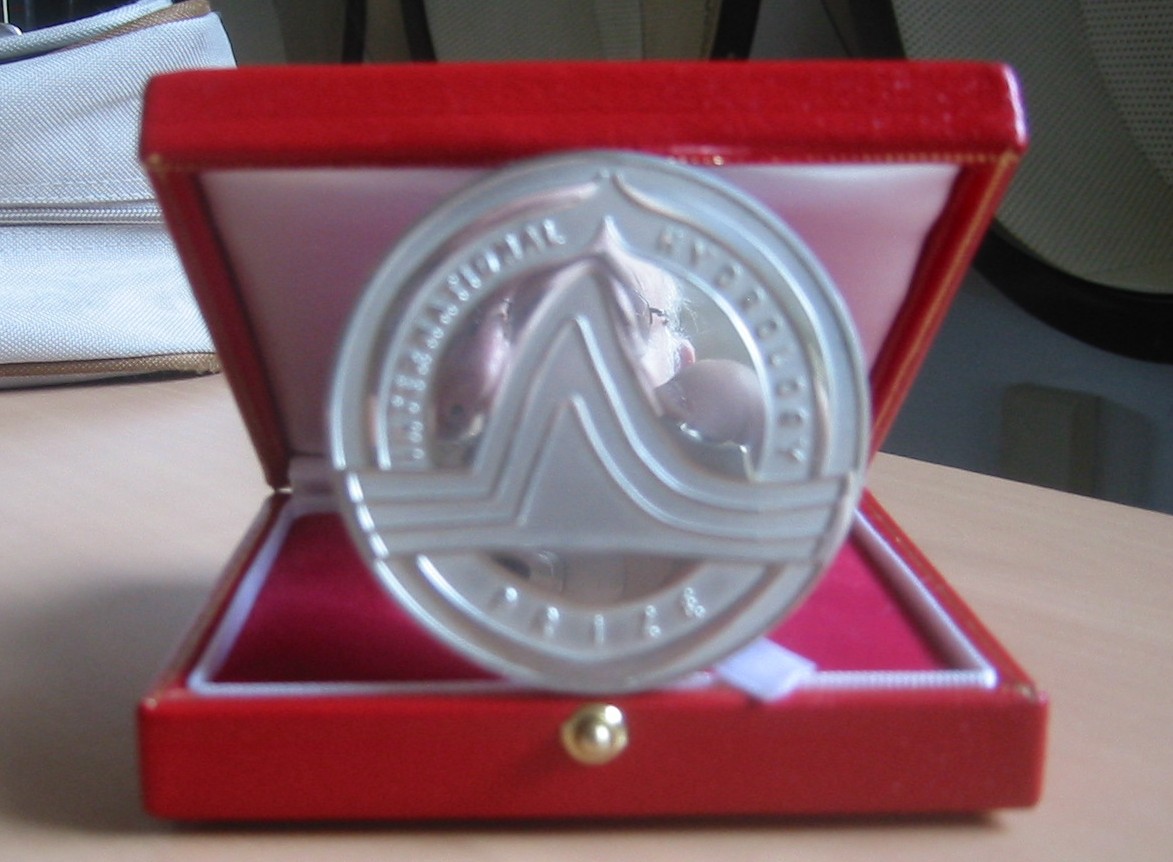
Volker medal - Harry F. Lins, USA
Nominations for the annual Prize are made by National Committees to IAHS, National Committees to the UNESCO-IHP or National Hydrological Advisors to the WMO, and forwarded to the Secretary General of IAHS for consideration by the Nomination Committee. The Committee consists of the President and a Vice-President of IAHS and representatives of UNESCO and WMO.
As of 2014, two medals are awarded under the International Hydrology Prize: the Dooge medal and the Volker medal. Both medals are intended to distinguish outstanding achievements by hydrological scientists but with a different focus. The Dooge medal is aimed at fundamental contributions to the science of hydrology, whereas the Volker medal is aimed at outstanding applications of hydrological science for the benefit of society at large.
https://iahs.info/About-IAHS/Competition--Events/International-Hydrology-Prize.do
Our warmest congratulations go to both recipients.
Launch of the United Nations World Water Development Report 2021 on Valuing Water
Today, the United Nations World Water Development Report 2021 on Valuing Water, the UN-Water flagship Report on water issues, was published by UNESCO and coordinated by the UNESCO World Water Assessment Programme.
The Report assesses the current status of and challenges to the valuation of water across differing sectors and perspectives and identifies ways in which valuation can be promoted as a tool to help achieve sustainability.
IAHS contributed to chapter 5 (Food and agriculture) and chapter 11 (Knowledge, research and capacity development as enabling conditions).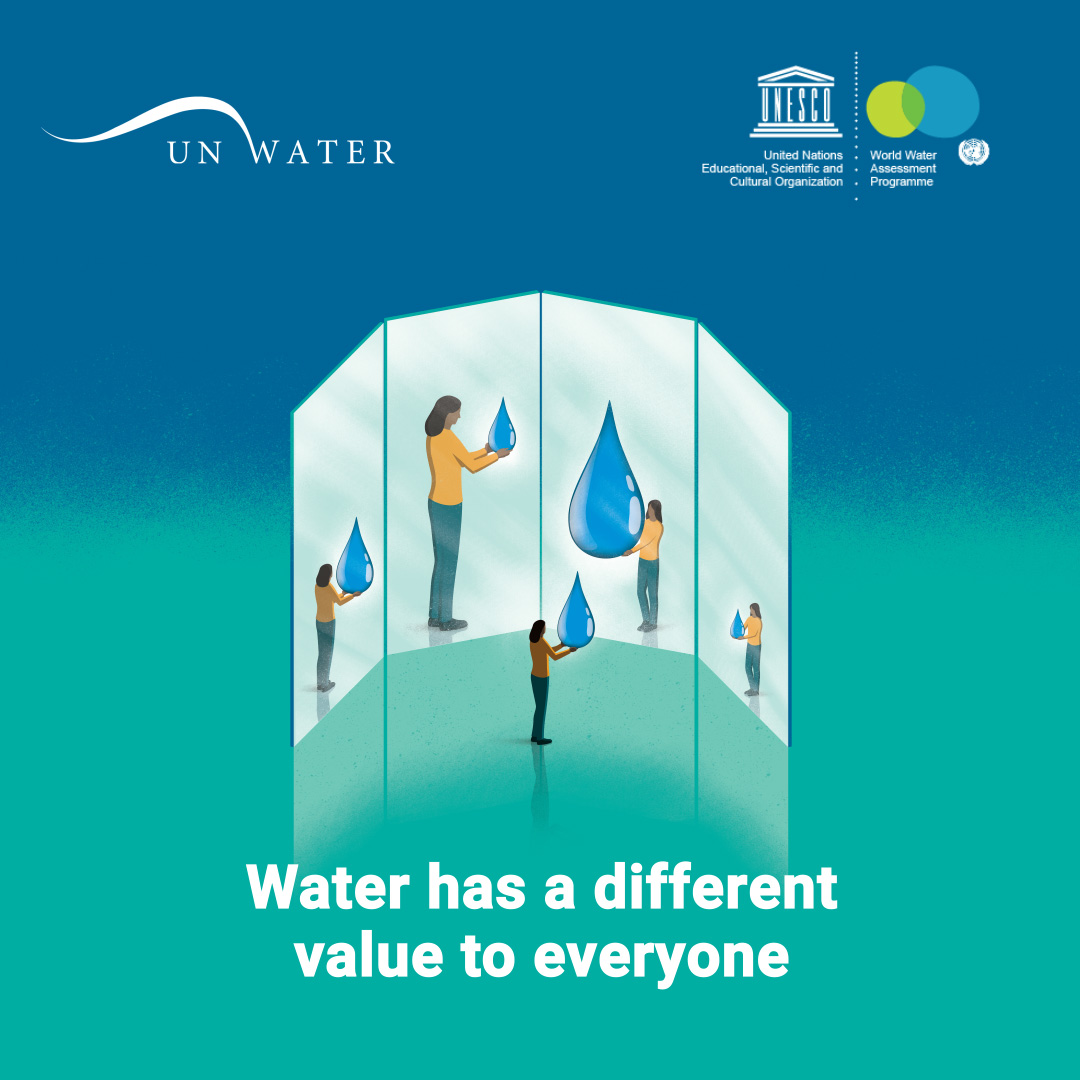
The Report is available for free download, in English, French and Italian.
The Executive Summary is available in 11 languages.
The Audiobook of the Executive Summary is available in 4 languages.
Hydrological Sciences Journal 2020 Awards
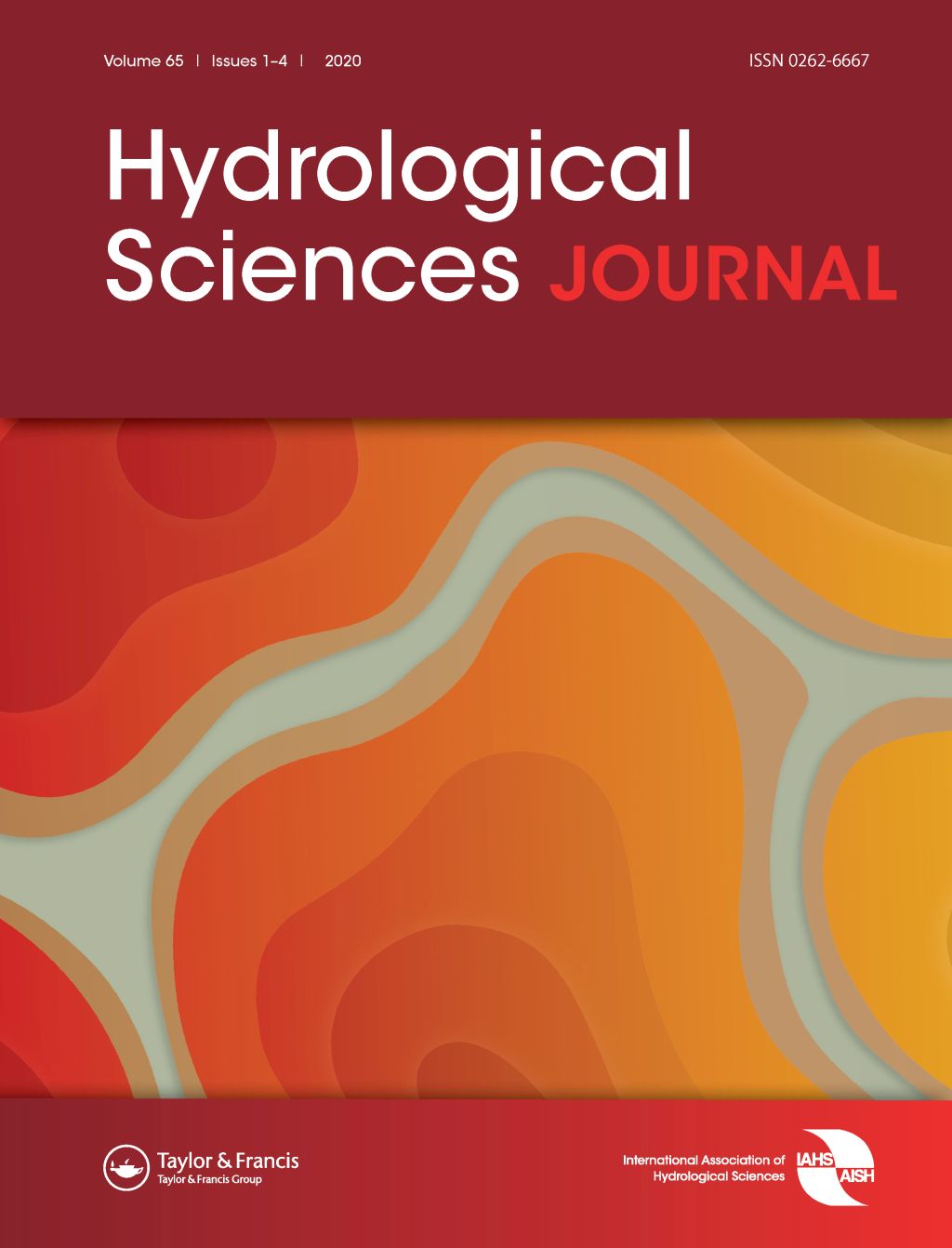 Hydrological Sciences Journal (HSJ) is the official Journal of the IAHS and provides a forum for original papers and for the exchange of information and views on significant developments in hydrology worldwide. It is published by Taylor & Francis and is available online and in print format.
Hydrological Sciences Journal (HSJ) is the official Journal of the IAHS and provides a forum for original papers and for the exchange of information and views on significant developments in hydrology worldwide. It is published by Taylor & Francis and is available online and in print format.
We recognise the time and effort provided by our editors and manuscript reviewers in supporting authors to produce better papers, and it is with this in mind that we recently announced new awards:
1. The Hydrological Sciences Journal Associate Editor Award is granted for outstanding overall contribution to the journal’s impact and visibility, and excellence in supporting authors and editors through the peer review process. The award (a significant cash prize) is granted annually by IAHS, with the support of Taylor & Francis, to one Associate Editor identified by the HSJ Editors. In 2020 it was awarded to Konstantinos Soulis (Greece).
2. The Hydrological Sciences Journal Reviewer Award is granted for outstanding contribution to the journal, and excellence in supporting authors and editors with timely and relevant reviews. The award (comprising a cash prize and book tokens) is granted annually by IAHS, with the support of Taylor & Francis, to reviewers identified by the HSJ Editors. In 2020 awards were granted to Ozgur Kisi (Turkey) and Andrzej Walega (Poland).
Our congratulations go to all of our awardees.
2020 IAHS Tison winners announced
IAHS are pleased to announce that the 2020 Tison award goes to Eleni Maria Michailidi (Greece) and Sylvia Antoniadi (Greece) for their work on the 2018 Hydrological Sciences Journal paper:
Eleni Maria Michailidi, Sylvia Antoniadi, Antonis Koukouvinos, Baldassare Bacchi & Andreas Efstratiadis (2018) Timing the time of concentration: shedding light on a paradox, Hydrological Sciences Journal, 63:5, 721-740, DOI: 10.1080/02626667.2018.1450985
The paper was co-authored by Antonis Koukouvinos (Greece), Baldassare Bacchi (Italy) & Andreas Efstratiadis (Greece) who are not eligible for the Tison Award, age-wise.
This award is prestigious with a 1000 US$ prize and a 1 year subscription to HSJ sponsored by Taylor & Francis the publisher of Hydrological Sciences Journal.
The paper is free to access at https://www.tandfonline.com/doi/full/10.1080/02626667.2018.1450985
The IAHS Tison Award, established in 1982, aims to promote excellence in research by young hydrologists. The Award is granted for an outstanding paper published by IAHS in a period of two years previous to the deadline for nominations. The description of the award is available at https://iahs.info/About-IAHS/Competition--Events/Tison-Award.do
Frances Watkins, Editorial Manager of HSJ, retires
After 27 years dedicated contribution to IAHS and its official journal, Hydrological Sciences Journal (HSJ), Frances Watkins retires on 26 February 2021.
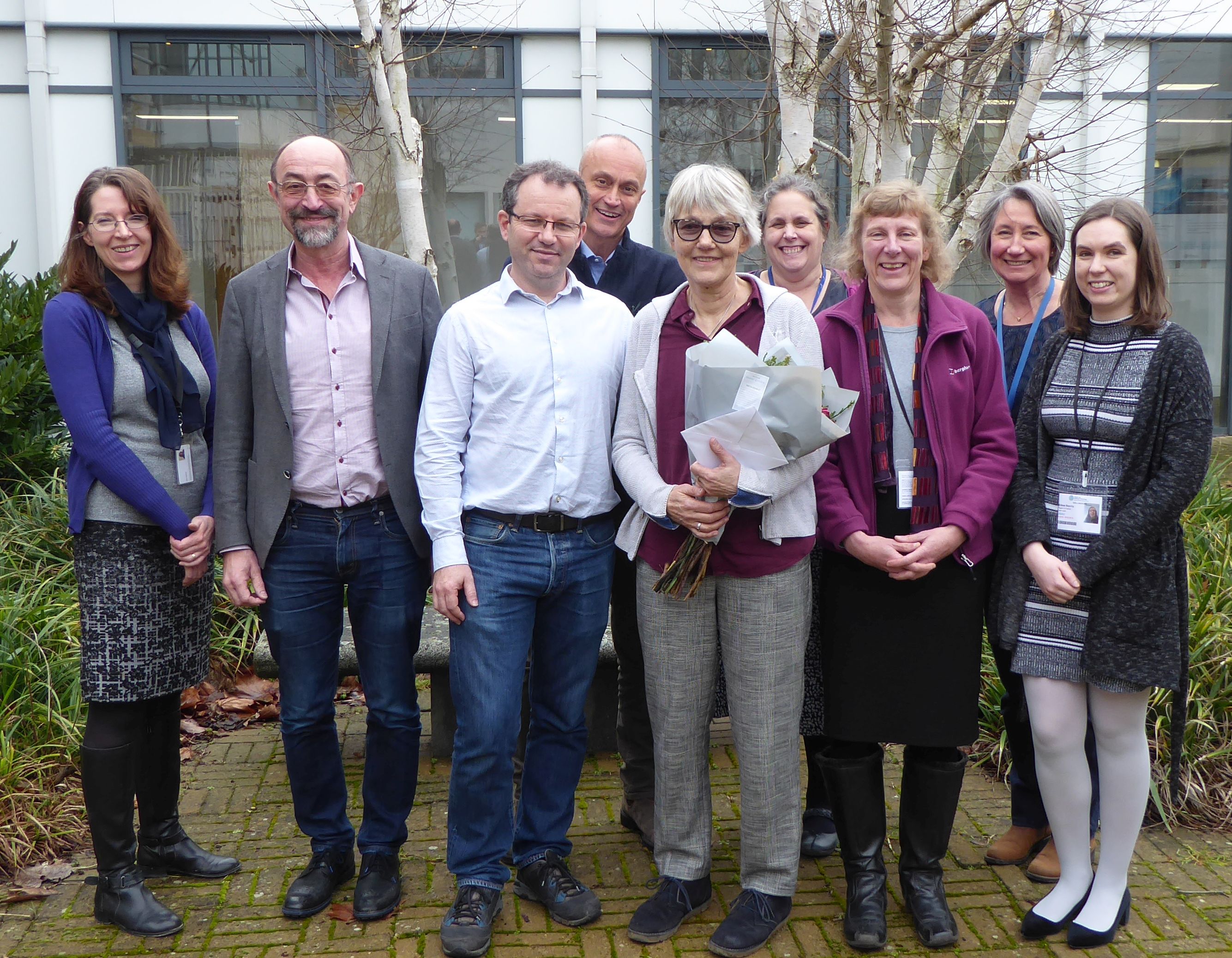
Pictured left to right - Sara Rafferty (HSJ Editorial Assistant), Günter Blöschl (President IAHS), Christophe Cudennec (Secretary General IAHS), Attilio Castellarin (Editor-in-Chief HSJ), Frances Watkins (HSJ Editorial Manager), Helen Houghton-Carr (Company Secretary IAHS), Kate Heal (Treasurer IAHS), Claire Lupton (Executive Secretary IAHS) and Eilise Norris (Managing Editor Agriculture, Environment and Water for Taylor & Francis) in 2019.
There have been many changes in IAHS, HSJ and publishing over the past 27 years, but one constant – in addition to Frances - has been the location of the IAHS Office in Wallingford, UK, formerly the Institute of Hydrology (now the UK Centre for Ecology & Hydrology), where Frances joined Penny Kisby and Jill Gash in November 1993. Frances’ first project was HSJ volume 39 (1994), which included 6 issues and about 700 pages. In those days papers arrived as hard copies by post, and were typed-up and edited in WordPerfect 5.1. To indicate the scale of changes since, the latest HSJ volume 65 (2020), contained 16 issues and 2826 pages, all handled electronically. The number of Associate Editors has increased from 30 to 60 and there are now three HSJ Co-Editors – Attilio Castellarin, Stacey Archfield and Aldo Fiori – building upon the advances of previous Editors - Terence O’Donnell, Zbigniew (Zbyszek) W. Kundzewicz, Demetris Koutsoyiannis, Mike Acreman and Ross Woods. To support the growth of HSJ, Sara Rafferty joined the IAHS Office as Editorial Assistant in 2017, focussing on the processing of papers and communications with Associate Editors and reviewers under the management of Frances.
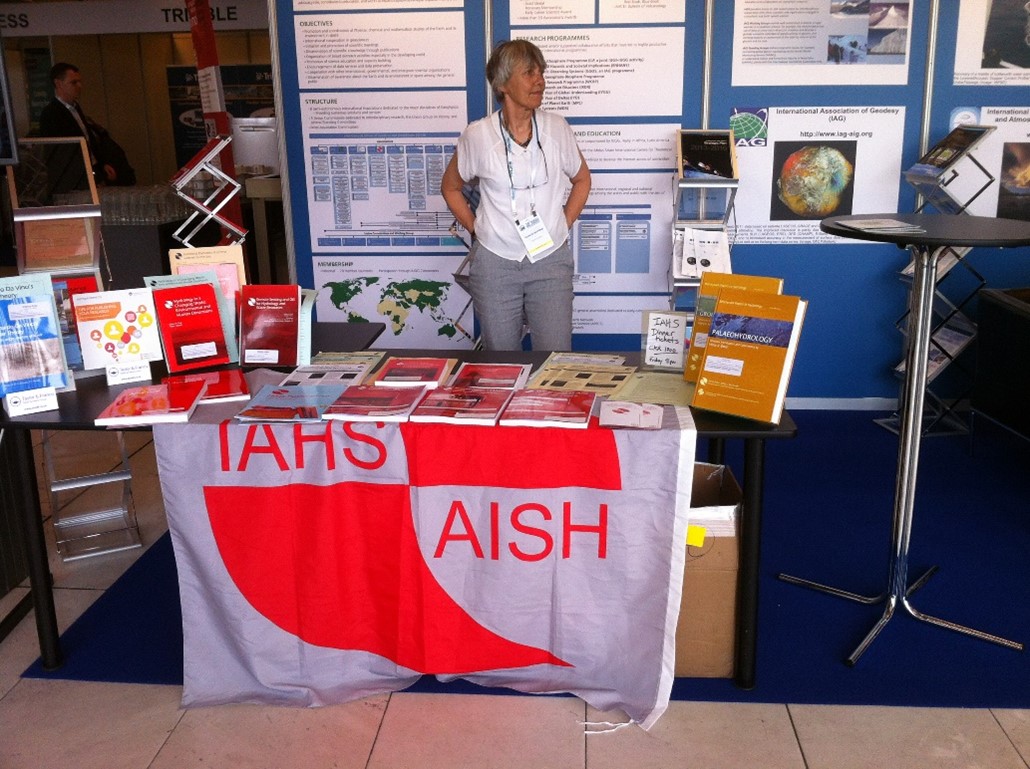
The continued growth and success of HSJ over the past 27 years, whilst maintaining high scientific and linguistic standards, would not have been possible without Frances. Frances is renowned for her English language skills, high quality of work and attention to detail. She has used these to support the publication of papers from hydrologists all around the world, especially early career scientists, thus helping IAHS to fulfil its charitable mandate. As well as her HSJ duties, Frances worked on the production and copy editing of many IAHS Red Books. Frances has also developed excellent relations with Taylor & Francis, publishers of HSJ since 2010, who provide valuable expertise and promotion of HSJ, and now do most of the copy editing. Through all these activities, Frances supported Cate Gardner, who followed Penny Kisby as Manager of IAHS Press, until Cate’s retirement in 2015.
Following the reorganisation of the IAHS Office under Cate’s leadership and the appointment of Claire Lupton as IAHS Executive Secretary in 2015, Frances has helped Claire maintain the friendly and efficient reputation of all IAHS operations. Many will recall Frances not just from her beautifully written emails, but from meeting her in person at the IAHS stand at Scientific and General Assemblies, or at HSJ editorial retreats.
As with her careful work for HSJ, Frances’ retirement has been well-planned and organised. Frances gave advance notice of her intentions, enabling IAHS to appoint Lottie Rundall as HSJ Editorial and Production Coordinator in January 2020. This has allowed a 1-year handover to tap Frances’ encyclopaedic knowledge of HSJ before Lottie took over the HSJ Editorial Manager role.
Frances’ inputs to HSJ and IAHS have been outstanding over the past 27 years. She has overseen the publication of over two-thirds of HSJ pages ever published and tirelessly mentored HSJ Authors, Associate Editors, and Editors. Frances has achieved all this with her characteristic warmth and empathy, making the HSJ Editorial Team feel like a welcoming family. All the IAHS staff, HSJ Editors and Associate Editors, IAHS Officers past and present, and HSJ Authors send their best wishes to you, Frances, as you embark on a well-deserved retirement.
Kate Heal
Chair IAHS Ltd.
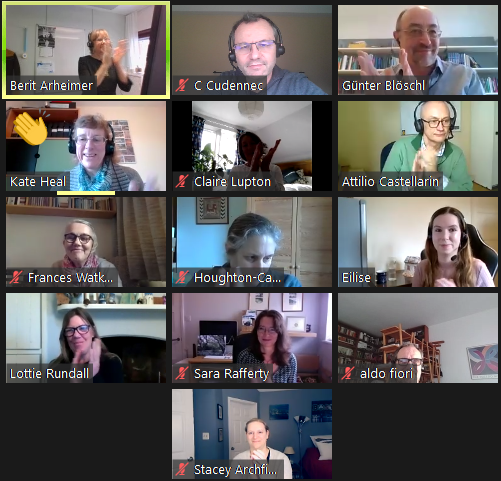
Obituary: Jim Shuttleworth
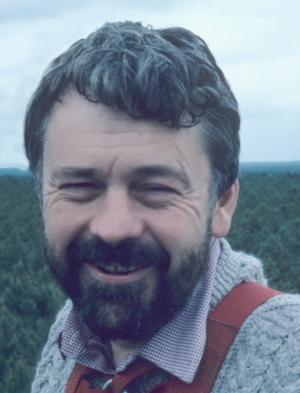
One of hydrology’s most eminent trail-blazing scientists, William James (Jim) Shuttleworth, an incredibly warm, kind and compassionate person, sadly passed away on 20th December 2020 at the age of 75.
Jim arrived at the UK Institute of Hydrology in 1972: with a nuclear physics background, he looked at hydrology with fresh eyes.
He was recruited to work on a project making Bowen ratio measurements of forest evaporation. Faced with the difficulty of measuring the very small temperature and humidity gradients found above forest, Jim rapidly concluded that there must be an easier way. The strongest candidate was the eddy-correlation method and Jim’s vision saw a minimalist battery-powered instrument that could operate continuously in remote places.
The successful development of this instrument transformed our ability to measure evaporation. The over 300 Fluxnet stations now using this approach have a provenance traceable back to Jim’s original device.
When an opportunity arose to exploit the new instruments measuring Amazonian evaporation, Jim grabbed it. Others saw the project in terms of understanding the water balance of the rainforest, but Jim recognized it as an opportunity to pioneer a new field of global hydrology, combining hydrological measurements with new global models.
In the early 1980s, with Global Circulation Models, in their infancy, only a handful of visionaries believed in their potential to predict future climate. An early application was to predict the climatic consequences of deforesting the Amazon basin. Yet the representation and parameterization of the forest in these models was basic — often just guesswork. By linking directly to scientists at NASA and the UK Met Office Jim ensured that the Amazonian demonstration of how micrometeorological land surface flux measurements could anchor models to the real world, was rapidly incorporated into the new GCMs, thus kick-starting many other international experiments.
Jim joined the Department of Hydrology and Water Resources at The University of Arizona in 1993, ultimately becoming Regents Professor. He created their first degree programme in hydrometeorology, writing the definitive textbook on the subject, and instigating their Hydrology and Atmospheric Sciences (HAS) programme.
Jim maintained his theoretical ability throughout and among his 200 scientific publications - "Evaporation From Sparse Crops - An Energy Combination Theory" has been cited over 2000 times.
Among his many international recognitions are the International Hydrology Prize in 2006, and the AGU Robert E. Horton Medal in 2014 for “outstanding contributions to hydrology.” (https://profiles.arizona.edu/person/shuttle)
Jim is survived by his beloved wife Hazel, three of his four sons and one daughter, fifteen grandchildren, and three great-grandchildren. And, of course, by those of us lucky enough to have had him as one of our dearest friends, who will all miss him very deeply.
Colin Lloyd, Jim Wallace and John Gash
Figure caption: Jim Shuttleworth on the Les Landes forest tower during HAPEX-MOBILHY, in 1986.
IAHS related sessions at the upcoming virtual EGU General Assembly (19-30 April 2021)
We would like to draw your attention to two IAHS related sessions in the Hydrological Sciences (HS) programme at the upcoming virtual EGU General Assembly (19-30 April 2021) related to the Unsolved Problems in Hydrology (UPH) initiative and the Panta Rhei decade.
HS1.2.3 Pathways towards solving the Unsolved Problems in Hydrology (UPH)
https://meetingorganizer.copernicus.org/EGU21/session/39751
The IAHS in collaboration with the Hydrology Divisions of EGU and AGU as well as the IAH, launched in 2017 a public consultation process for compiling a list of unsolved scientific problems in hydrology which resulted, in 2019, in a set of 23 Unsolved Problems in Hydrology (UPH) (see https://doi.org/10.1080/02626667.2019.1620507).
The UPH are articulated around 7 themes: Time variability and change, Space variability and scaling, Variability of extremes, Interfaces in hydrology, Measurements and data, Modelling methods, and Interfaces with society. Some of the UPH may have already been partially studied. Recent research may shed light on how to move forward in a more holistic way. A crucial issue is to put together fragmented knowledge to address the questions raised and enhance coherence in hydrological sciences.
The purpose of this session is to discuss progress in any of the 23 UPH. Contributions are encouraged to either:
- present research results that advance the understanding of any of the 23 UPH,
- review (or present a contribution to review) the state of the art of one (or more) of the UPH, pointing towards directions where progress is most promising.
Authors are asked to clearly state the UPH their work refers to or could contribute to solve. The authors may also reflect on how the community could evaluate if an UPH can be considered solved or not.
HS1.2.4 Panta Rhei: hydrology, society & environmental change
https://meetingorganizer.copernicus.org/EGU21/session/39110
This session is organized as part of the IAHS Panta Rhei hydrological decade 2013- 2022 focusing on gains in our understanding of water cycle processes by focusing on their changing dynamics in respect of interactions and feedbacks with human systems. Approaching the end of this Panta Rhei decade (2013-2022), it is time to synthesize the achievements of this decade. The main focus of this grand synthesis, which will be published in an IAHS book, is on coevolution and prediction of coupled human-water systems, including understanding of emergent phenomena, mechanisms, and implications for predictions and practices.
This session welcomes contributions that contribute to and critically reflect the following synthesis topics:
1) Theoretical/conceptual framework for understanding changes in hydrology and society;
2) Coevolution and emergent phenomena;
3) dynamic models;
4) Data needs and acquisition;
5) Benchmark datasets in various context and scales, including human-flood, human-drought, agricultural, transboundary and global systems;
6) Case studies from Panta Rhei working groups, IAHS Commissions and beyond.
Please note that the deadline is 20th January 2021 at 13:00 Central Europe Time.

